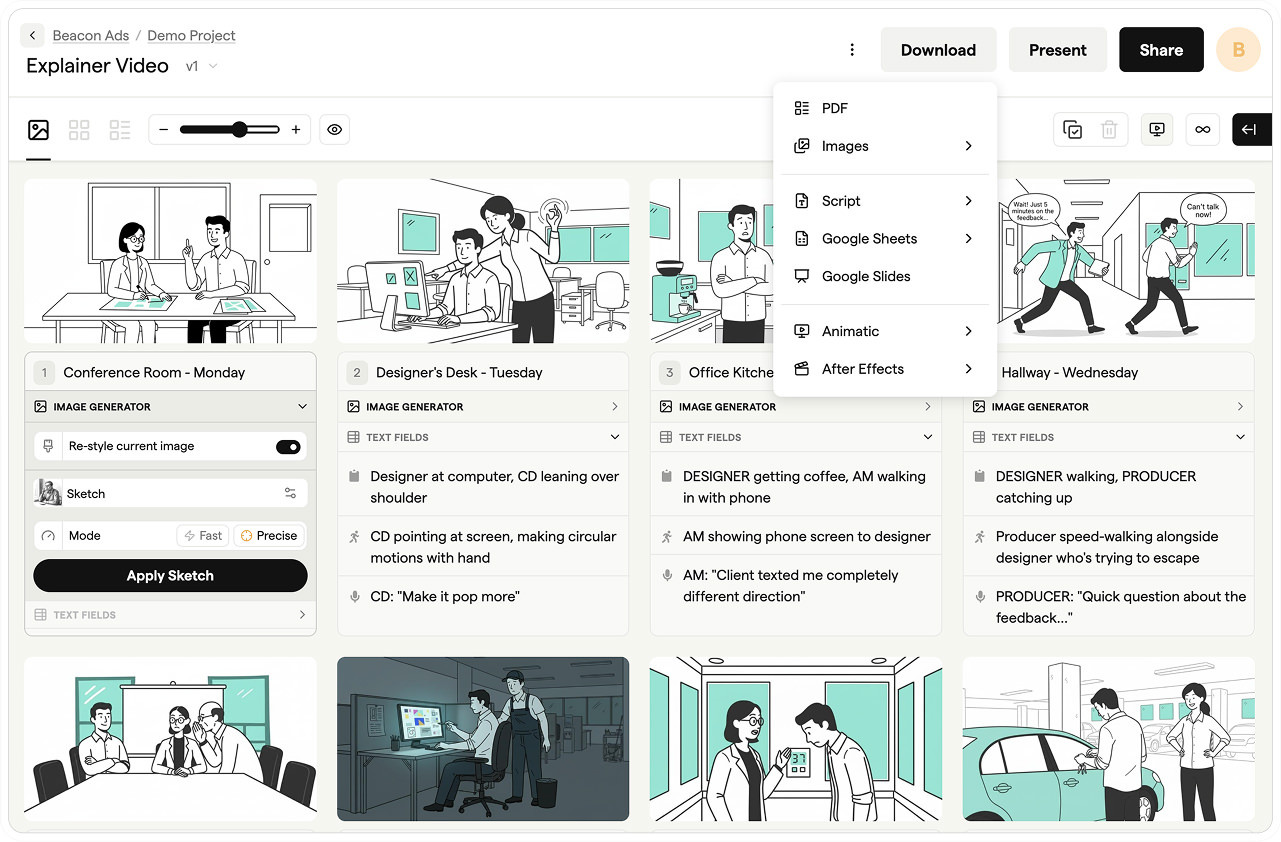The Three Types of Irony

Boords is storyboarding software built for studios & agencies
Create consistent storyboards fast, iterate quickly, then share for feedback.
Try Boords FreeLots of people understand irony in some sense but find it hard to explain – despite all those high school English lessons.
So here's an irony definition. It's a literary device that highlights the incongruity (a fancy word for 'difference') between one's expectation for a situation, and the reality.
Part of the reason people find it hard to give a definition of irony is because of Alanis Morissette's 1995 hit song 'Ironic'. Morissette sings about a number of situations – like rain on one's wedding day – that, while inconvenient, aren't ironic. Which means people like us need to rescue storytellers everywhere by writing a blog that explains what this literary term actually is. (You're welcome.)
Real irony examples, unlike those in the song, would be situations like a pilot having a fear of heights or a lifeguard who can't swim. They're situations where there's a stark contrast between the expected outcome and what actually occurs - a plot twist of sorts.
A little bit of history
Although she popularised irony, Alanis Morissette didn't invent it. That honour goes to the Greek character, Eiron. He was an underdog who used his considerable wit to fight another character. This spawned the Greek word eironeía, the literal meaning of which is 'purposely affected ignorance.' It then entered Latin as ironia, with the word irony becoming a popular English figure of speech in the 16th century.
Irony in literature is like a secret nudge from the author to the reader, a hidden layer of meaning or humor. It comes in various flavors: situational irony, where the outcome is deliciously contrary to what was expected – think of a fire station catching fire, a plot twist you didn’t see coming! Then there's dramatic irony, akin to the audience being in on a secret that the characters are oblivious to, creating a tension that’s almost palpable. And let’s not forget verbal irony, where the spoken words are a clever opposite of what is meant, dripping with sarcasm or wit.
Irony isn't just a mismatch between expectation and reality; it's a sophisticated tool that writers wield to add depth, humor, and a dash of the unexpected to their stories. It's a literary spice that can transform a simple narrative into a gourmet feast for the mind.
The three different types of irony
1. Dramatic irony
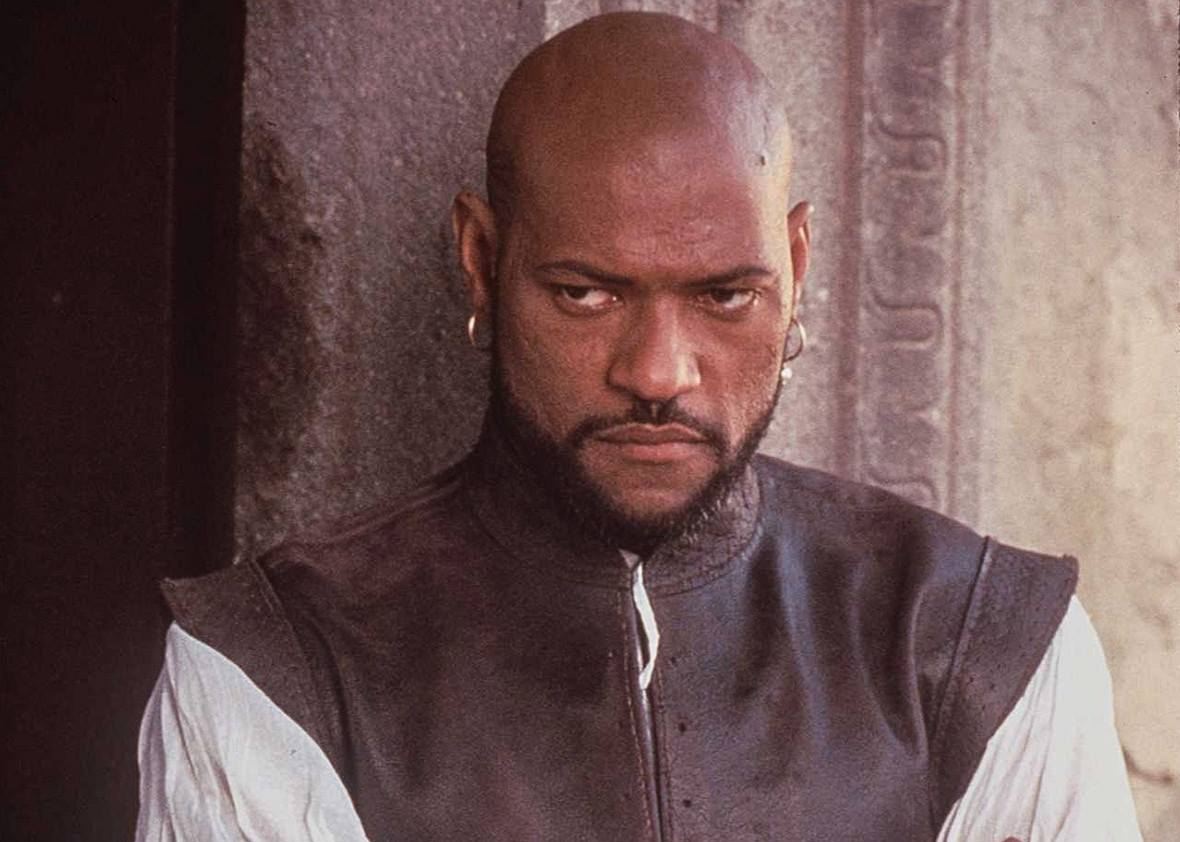
Dramatic irony occurs when your audience has more information than your character(s) in a story. This nifty literary device became popular in Greek tragedy – and, true to the genre, the different point of view often leads to tragic outcomes.
One great example is in Shakespeare's smash hit, Othello. The audience knows that Othello's BFF Iago is a bad guy who wants to ruin Othello. The audience also knows that Desdemona has been faithful. Othello doesn't know either of these things. This means that the audience can sense some imminent fireworks – while poor Othello remains in the dark.
There are three stages to this type of irony: installation, exploitation, and resolution. In Othello's case:
- The installation happens when Iago persuades Othello that Desdemona is having an affair with the mysterious Cassio (not to be confused with the watch brand)
- The exploitation happens when Iago plants Desdemona’s handkerchief, a gift from Othello, in Cassio’s room
- The resolution happens when Othello murders Desdemona after her friend Emilia says what Iago's been up to
This pattern creates a powerful emotional impact, as the audience anticipates the characters' realization of the truth. The build-up of tension, expectation, and impending doom helps to create suspense, making this form of irony such a compelling storytelling tool.
A common example of dramatic irony: In the film The Truman Show, where Truman is the only person who doesn't know that he's being filmed all the time. The audience's superior knowledge creates a sense of suspense and sympathy, as we watch Truman unknowingly live in a fabricated reality.
2. Situational irony
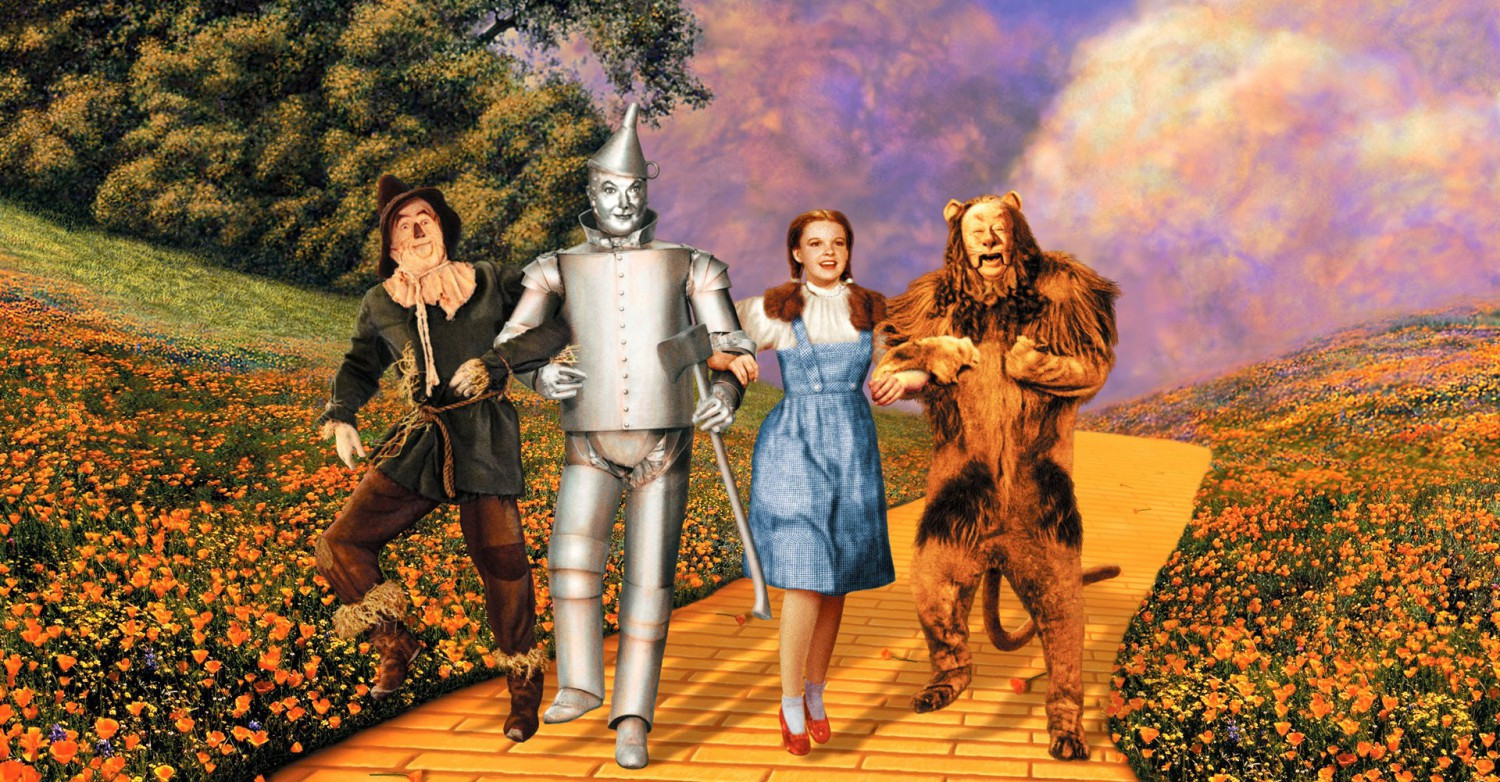
Situational irony is when the outcome of a situation is totally different from what people expect. This type of irony is a literary technique that's riddled with contradictions and contrasts. Situational irony often leads to humor or a deeper reflection on the unpredictability of life and circumstances.
For example, the book The Wonderful Wizard of Oz has a clear example of situational irony. All the people in Emerald City assume that its Oz is powerful and impressive. However, Oz turns out to be the exact opposite: an old man with no special powers. This unexpected outcome not only surprises the characters but also the readers, as it completely overturns their expectations based on the initial build-up.
A common example of situational irony: In 1925, when the New York Times said the crossword puzzle was a craze that was “dying out fast”. That didn't age well. Ironically, crossword puzzles have become a timeless hobby, with the New York Times itself famous for its challenging crosswords. This example of real life irony shows how real-life scenarios can also be situationally ironic, where the actual outcome of events starkly contradicts the initial expectations or predictions.
These situational irony examples, from The Wonderful Wizard of Oz to the New York Times' prediction, showcase the unexpected and often humorous contrasts between expectation and reality.
3. Verbal irony

Verbal irony is when your speaker says something that's the opposite to what they mean. While it sounds similar to sarcasm, it's not exactly the same. People usually use sarcasm to attack something, but that's not always the case with irony.
Ironic understatement, a form of verbal irony, involves making a statement that significantly downplays the actual situation, thereby creating a stark contrast between the words used and the reality, which often results in a humorous or emphatic effect.
Ironic overstatement, on the other hand, magnifies a situation's literal meaning to an absurd degree, humorously contrasting with the intended meaning. For instance, claiming "I'm absolutely drenched" during a light drizzle is an ironic overstatement, where the exaggeration amusingly underscores the minor nature of the actual situation. This rhetorical device effectively adds a layer of humor and irony by deliberately distorting reality.
Our old friend Alanis Morrissette did manage to get one example of irony into her song. When the man (in the song) whose plane is going down says "Well, isn't this nice", it's clearly in the form of verbal irony. He's not actually happy that the plane's about to crash, so his statement is the opposite of what he means.
One more note: unlike dramatic irony and situational irony, verbal irony is always an intentional move by the speaker. It’s a clever play of words, often used to add humor, express subtlety, or convey complex emotions in a nuanced way. This form of irony is a staple in witty conversations and literature, as it allows the speaker to express criticism, skepticism, or amusement indirectly.
A common example of verbal irony: When people say "What a pleasant day!" when there's a thunderstorm outside. The jokers.
Verbal irony examples are commonplace in everyday speech, for instance is when someone who faced a series of misfortunes remarks, “Just my luck!” Clearly, the luck referenced here is far from good, showcasing the intricate dance of meaning that verbal irony plays and the ways in which ironic understatement creates contrast. Verbal irony can also be seen in statements like, "I love spending hours in traffic," where the speaker's actual frustration is masked under a facade of enthusiasm, providing a subtle but effective critique of the situation.
Boords is storyboarding software built for studios & agencies
Create consistent storyboards fast, iterate quickly, then share for feedback.
Try Boords FreeExamples of irony
Dramatic irony example: The Gift of the Magi
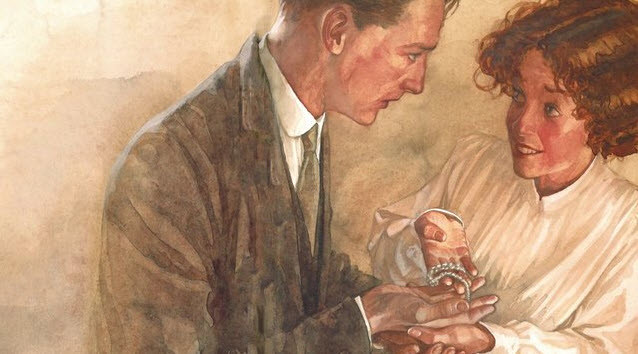
O. Henry's short story The Gift of the Magi is jam-packed with irony, all in the name of teaching the reader about sacrifice and love. When Della opens her gift of tortoiseshell combs from Jim, it's dramatic irony because she briefly forgets that her hair is too short to wear them. It's also dramatic irony if the reader guesses in advance that Jim sold his watch to buy the precious combs.
This moment of realization for the reader, contrasting with Della's temporary forgetfulness, heightens the emotional impact of the story. The dramatic irony lies in the audience’s awareness of the complete picture, understanding the depth of both characters' sacrifices, while the characters themselves are oblivious to the full extent of each other's actions. This irony adds layers of meaning to the theme of selfless love, making the story's ending both poignant and profound. The Gift of the Magi thus becomes a classic example of how irony can be used to enhance the storytelling, making the final revelation more impactful for both the characters and the audience.
Situational irony example: Pride and Prejudice
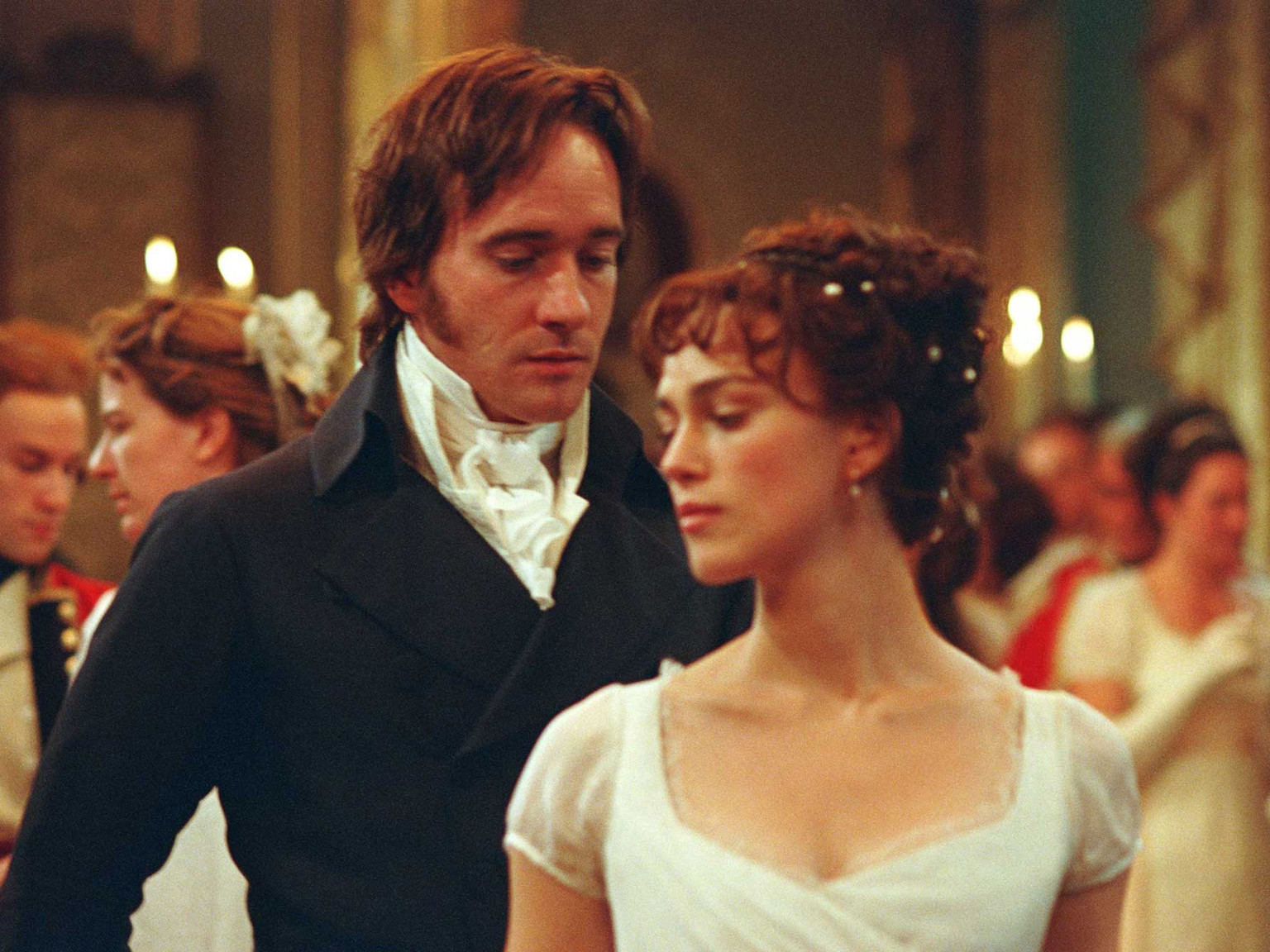
Jane Austen was a master of irony, filling her novels with the stuff. Early in Pride and Prejudice, Elizabeth is asked to play and sing at a party at Lucas Lodge. At the same time, Sir Lucas is trying to persuade Mr. Darcy to dance, an offer that he rejects. But then Sir Lucas spies Elizabeth, and encourages Mr. Darcy to ask her for a dance – which he dutifully does. It's a total reversal of his earlier behavior (he claims to hate dancing), making it the perfect example of situational irony.
This scene becomes even more ironic when considering Mr. Darcy's earlier disparaging remarks about Elizabeth. His change of heart and subsequent action directly contradict his previous stance, delighting the reader with the unexpected twist and highlighting Austen's skill in using situational irony to develop her characters and advance the plot. This moment also foreshadows the evolving relationship between Elizabeth and Mr. Darcy, adding layers of complexity to the narrative and underscoring the unpredictable nature of human behavior.
Verbal irony example: Julius Caesar
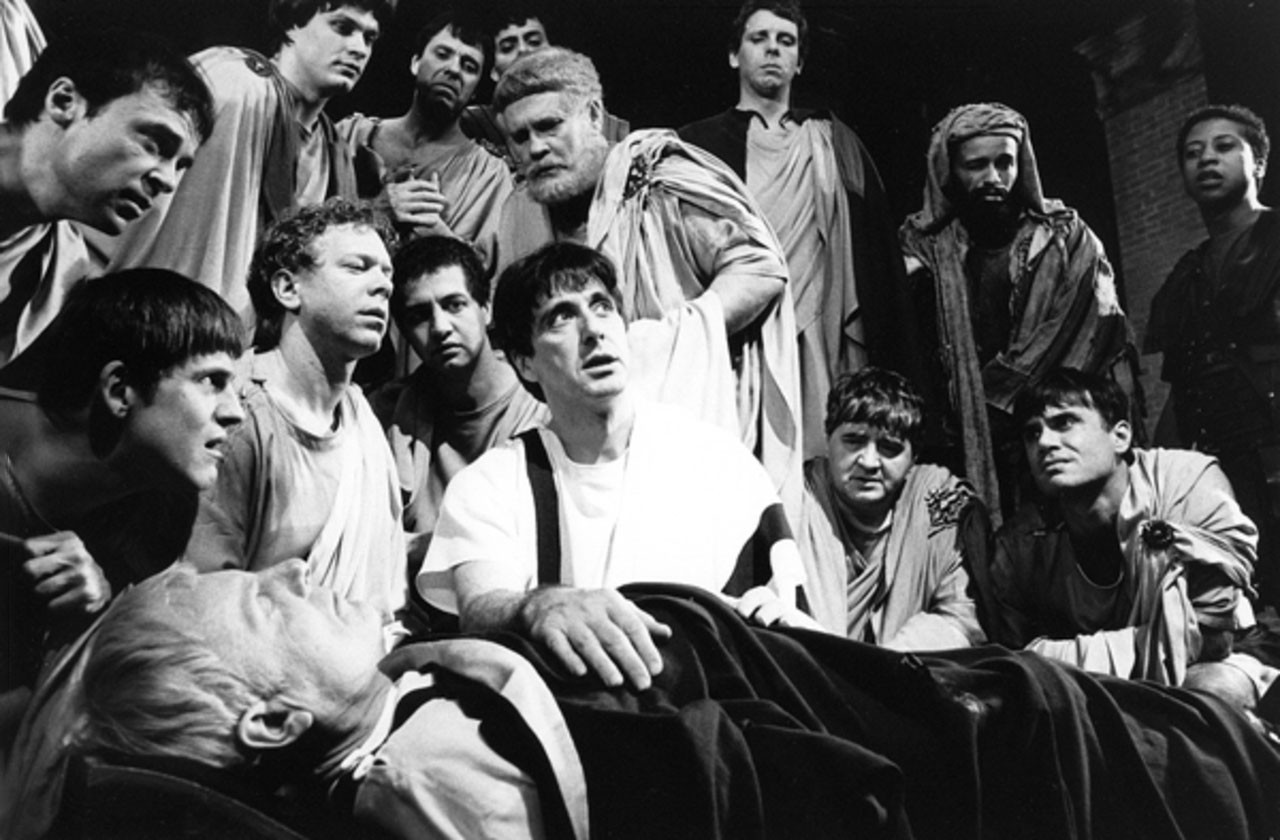
Our mate William Shakespeare issues a cracking example of verbal irony in his play Julius Caesar. When Mark Antony says 'But Brutus says he was ambitious; / And Brutus is an honourable man', it seems as if he's praising Brutus after the assassination of Julius Caesar. However, it's nothing but a witty ruse. Mark Antony is actually implying that Brutus isn't ambitious or honourable at all. Sneaky!
This repeated statement becomes increasingly ironic with each repetition, as Antony subtly undermines Brutus's credibility and honor in the eyes of the Roman public. Antony's clever use of verbal irony here serves a dual purpose: it allows him to publicly denounce Brutus without directly opposing him, and also sways the opinion of the masses by casting doubt on Brutus's motives and character. Shakespeare's mastery in using verbal irony is evident in this scene, as it adds a layer of sophistication to Antony's character and plays a pivotal role in the unfolding political drama.
Other types of irony
For bonus points, here are a few extra types of irony. They're perfect for days when you want to dial the irony all the way up to eleven.
Cosmic irony is when irony goes to a whole other, godly level. Why? Because you only get it in stories that contain gods who want different things to humans. These gods might play with humans' lives for kicks, creating oodles of ironic situations. The irony is the contrast between what the humans expect, and what actually happens. This type of irony mostly occurs in Greek legends, where divine intervention often leads to outcomes drastically different from human desires. This interplay between human efforts and divine will creates a rich tapestry of storytelling, where fate plays a crucial and often surprising role.
Historical irony is all about real events that – when you look at them in the rearview mirror – turned out a lot different than people predicted. Like the Chinese alchemists who discovered gunpowder when they were looking for a way to create immortality. Ironically, instead of prolonging life, their invention became a tool in warfare, having quite the opposite effect. It's like history has a sense of humor, showing us time and again how things can take unexpected turns. Imagine building something like the Great Wall of China to keep invaders out, but then finding it's not always effective. This type of irony really puts a twist on our understanding of the past, teaching us that outcomes can be as unpredictable as they are intriguing.
Socratic irony was named after the philosopher Socrates. This old rascal would pretend to not know about a topic during a debate, leading his opponent to reveal all their nonsensical arguments. It's also an example of dramatic irony because mischievous Socrates was pretending to have less information than he actually did. Socratic irony wasn't just a clever debate tactic; it was a way for Socrates to encourage others to examine their own beliefs and arguments more critically. Through his feigned ignorance, he often guided people to discover contradictions in their own thoughts, leading to deeper understanding and self-awareness. Socratic irony is a brilliant example of using irony not just for humor or effect, but as a tool for learning and philosophical exploration.
Tragic irony is a little step up from dramatic irony. We see it in Romeo and Juliet, where our two lovers find out the truth slightly too late to prevent a tragedy. Hence the 'tragic' part. It’s like the universe has a sad story to tell, and we, as the audience, can see the heartbreak coming even when the characters can't. This type of irony adds a deep emotional layer to stories, making them more poignant and impactful. Imagine the irony in a story where a character’s efforts to avoid a bad outcome are precisely what lead to that very outcome. That’s the essence of tragic irony – it's about the inevitable collision between our actions and fate, often leading to a heartfelt, emotional climax that stays with us long after the story ends. It's a powerful storytelling tool that not only entertains but also makes us ponder the complexities of life and fate.
Conclusion
Irony is a multifaceted and powerful literary device that adds depth, humor, and poignancy to storytelling. With irony examples ranging from the subtle hints of verbal irony in everyday conversations to the heart-wrenching twists of tragic irony in classic literature, it challenges our perceptions and expectations, creating rich, layered narratives. Whether it's the cosmic irony of fate playing tricks on mortals, the historical irony of events turning out unexpectedly, or the clever questioning of Socratic irony, each form invites us to look beyond the obvious and appreciate the complexities of communication and life itself. Irony, in all its forms, is not only entertaining but also enlightening, making it a timeless and invaluable tool in the hands of masterful storytellers.



